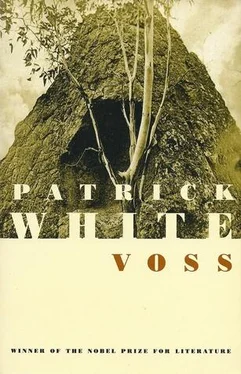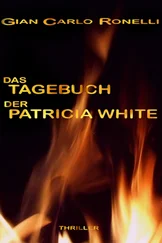‘Turner,’ he said, ‘your behaviour will always live down to what I would expect. You will please me by not molesting these people who are my guests.’
Someone who had begun to snigger did not continue. It was often thus in the presence of Voss. His laborious attitudes would fill the foreground and become the right ones.
Now he approached the black whose instincts had rejected Turner’s offer, and, holding out his hand, said stiffly:
‘Here is my hand in friendship.’
At first the blackfellow was reluctant, but then took the hand as if it had been some inanimate object of barter, and was turning it over, examining its grain, the pattern of veins, and, on its palm, the lines of fate. It was obvious he could not estimate its value.
Each of the white men was transfixed by the strangeness of this ceremony. It would seem that all human relationships hung in the balance, subject to fresh evaluation by Voss and the black.
Then the native dropped the hand. There was too much here for him to accept. Although something of this nature had been expected by his companions, Voss appeared somewhat saddened by the reception his gesture had received.
‘They are at that stage when they can only appreciate material things,’ he said in some surprise.
It was he who was in the wrong, to expect of his people — for as such he persisted in considering them — more than they were capable of giving, and, acknowledging his mistake, he promptly instructed the boy to fetch a bag of flour.
‘At least, sir,’ said Ralph Angus, ‘let us question them on the subject of the stolen cattle.’
Dugald did exchange with the natives a few, unhappy, private words. Then all was mystery, in a concert of black silence.
‘No know,’ said Dugald, in that sick voice he would adopt for any of his failures.
By this time the boy had lugged the flour into their presence, and Dugald was ordered to explain its virtues. This he did briefly, as people will confess unwillingly to the lunacy of some relative.
The blacks were chattering, and plunging their hands into the flour, and giving floury smiles. Then they swooped upon the bag, and departed through the valley, laughing. While yet in sight, some altercation of a semi-humorous nature arose, and many hands were tugging at the bag. One old woman was seizing handfuls of the flour and pouring it upon her head. She stood there, for a moment, in veils of flour, an ancient bride, and screamed because it tickled. They were all laughing then, and running through a rain of flour, after which they trailed the empty bag, until it was dropped, finally, in ignoble rags.
Such an abuse could have been felt most keenly by Voss, the benefactor, if at that moment the smells of roasting mutton had not arisen.
‘It is the dinner,’ cried Harry Robarts, quite forgetting the earlier stages of its preparation.
Judd had fixed the carcass above the coals of a fire, in a kind of shallow trench, and now the golden sheep was rustling with juices and spitting fat. Slabs of hot meat were presently hacked off for the whole company, who for once omitted to gnaw the bones before throwing them to the dogs. All were soon bursting, but still contrived to stuff down some of the hard puddings that Judd had improvised out of flour and currants, and boiled in water; even these were good on that day. Afterwards the men lay in the grass, and embroidered on their past lives, stories such as nobody believed, but to which they listened contentedly.
Even Voss descended from his eminence, and was reviewing the past through benevolent gauze.
‘I can remember in the house of my parents a green stove. It was composed of green tiles, you understand, of which the decoration was rampant lions, though they more resembled thin cats, it occurred to me as a boy.’
Everybody listened to the German. Exhausted by food, mellow with Christmas, they no longer demanded narrative, but preferred the lantern slides of recollection. Into these still, detached pictures entered the simplest members of the party as into their own states of mind.
‘Round that green stove we would sit on Christmas Evening: the relatives, some acquaintances, old women living off friendship, one or two boys apprenticed by my father. We would sing the Christmas songs. There was always a tree, a Tannenbaum , smelling as such trees will when they bleed from fresh wounds. Between all this festivity, and sweet things that were passing round, and the hot wine, I would hear the streets. It was the snow, filling and filling the empty streets, until we were lost, it seemed, in Christmas.’
The German paused.
‘So,’ he said. ‘It was not altogether different. Except for the snow, selbstverständlich . There was the snow.’
‘And except that we are not lost,’ Judd felt compelled to add.
Some of them laughed, and said they were not so sure. At that moment they would not have cared.
‘What did you use to eat, sir?’ asked Harry Robarts.
‘At Christmas, a goose. But on the Christmas Evening, always a fine carp.’
‘What is a carp, sir?’
But how could the German answer, who was so far distant?
In the cool of the evening, when those who had been feasting rose from their stupor of meat and dreams, Voss asked Judd to come with him, and they took horses, and rode out in the direction in which Jackie had gone to look for the lost cattle. It was not long before they had left behind all trace of that pleasant valley where they were camped, entering a dead country, in which the horses were continually stumbling, for they would plunge their feet into burrows or hidden pot-holes, and sink up to the pasterns in the crumbly earth.
Once in the course of this hard going, the horse which Voss was riding shied at a snake. The fact that it was a live one was surprising, for all else in the landscape appeared to be dead. The horse was immediately protesting, with his breath and his forelock, and the whites of his eyes. In that sudden leap, the German’s left temple and part of his forehead were scored by the branch of a dead tree, nothing serious, indeed, he would not have thought anything more of the matter, if the blood had not begun to trickle down into his eyes.
‘You should attend to it, sir,’ said Judd, on noticing that his leader was brushing away the blood.
‘It is nothing,’ Voss replied.
And frowned. With the result that the blood was again gushing, and tumbling down into his eyes.
‘Wait,’ said Judd.
Astonishingly, Voss did. They were both reining in. They were jumping down upon the ground. The convict took a handkerchief that he had but lately washed in the river at the place where they were encamped, and with which he was now preparing to bind the German’s head.
Should I let him? wondered the latter.
But he was already submitting. He was bowing his head. He could smell the smell of the crumpled, but spotless handkerchief, which had been dried on spikes of grass, at leisure, in the sun. He could hear the convict’s breathing, very close.
‘Is that too tight, sir?’ Judd was asking.
Although expert in being of service to others, frequently on such occasions he would experience a weakness so delicious that his skilful hands would bungle.
‘That is right. As it is,’ said Voss.
To surrender itself into other hands is one of the temptations of mortal flesh, the German knew, and shivered for an instant.
‘Do you say that somebody is passing over your grave?’ he laughed.
‘There is some such saying,’ replied the convict, whose eyes were examining his work with a detached affection.
When they had remounted and were riding on, Voss wondered how much of himself he had given into her hands. For he had become aware that the mouth of the young woman was smiling. It was unusually full and compassionate. Approbation must have gone to his head, for he continued unashamedly to contemplate her pleasure, and to extract from it pleasure of his own. They were basking in the same radiance, which had begun to emanate from the hitherto lustreless earth.
Читать дальше












